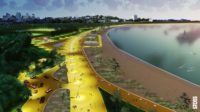There is a huge economy tied to climate change, and government officials, academics, engineers and contractors all are part of it, says Jesse Keenan, a social scientist on the faculty at the Harvard University Graduate School of Design and JFK School of Government in Science, Technology and Public Policy. He spoke Nov. 22 at the Building Climate Resilience into Infrastructure at a Climate Adaptation forum hosted by the Environmental Business Council of New England and the University of Massachusetts’ Sustainable Solutions Lab.
The half-day quarterly forum addressed how to incorporate climate resilience into planning, financing and maintaining infrastructure systems. The importance of multidisciplinary collaboration between governmental, academic, professional and community organizations was a common theme.
John Sullivan, chief engineer of the Boston Water and Sewer Commission, at the urging of Mayor Martin Walsh—who is concerned about having a flood disaster like the one Houston experienced in 2017—said the agency is developing a model to help control stormwater. Using data from the largest storms in Boston, it worked with climatologists to create a model that will predict where and how high the water will rise. The agency plans to unveil the model next year, along with a report on coastal stormwater discharge analysis, Sullivan said.
Mia Mansfield, director of climate adaptation and resilience at the Massachusetts Executive Office of Energy and Environmental Affairs, says there is growing demand to implement climate adaptation for communities. In its third round of grant allocation, the agency has 110 applications for $30 million in climate adaptation projects, which exceeds its current $10-million funding. She said she hopes that eventual passage of a state Senate bill, legislation introduced by Gov. Charlie Baker (R), will provide for climate-change adaptation investment for infrastructure, which will “help fund regional and other efforts to enhance resilience across the state.”







